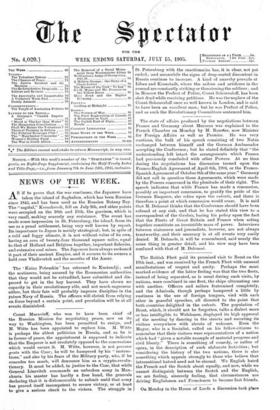Count Muravieff, who was to have been chief of the
Russian Mission for negotiating peace, now on its way to Washington, has been permitted to resign, and M. Witte has been appointed to replace him. M. Witte is perhaps the ablest politician in Russia, and as he is in favour of peace, the appointment is supposed to indicate that the Emperor is not resolutely opposed to the concessions which would secure it. M. Witte, however, is not persona grata with the Czar; be will be hampered by his "instruc- tions," and also by his fears of the Military party, who, if he concedes too much, will denounce him as a crypto-revolu- tionary. It must be added, in justice to the Czar, that while General Linevitch commands an unbroken army in Man- churia his master has hardly a free hand, the generals declaring that it is dishonourable to submit until that army has proved itself incompetent to secure victory, or at least to give a serious check to the victors. The struggle in
St. Petersburg with the reactionaries has, it is clear, not yet ended ; and meanwhile the signs of deep-seated discontent in Russia continue to increase. A kind of anarchy prevails at Libau and Kronstadt, where the sailors and artificers in the arsenal are constantly striking or threatening the soldiers ; and in Moscow the Prefect of Police, Count Schouvaloff, has been shot dead while receiving petitions. He was the nephew of the Count Schouvaloff once so well known in London, and is said to have been an excellent man; but he was Prefect of Police, and as such the Revolutionary Committees sentenced him.






































